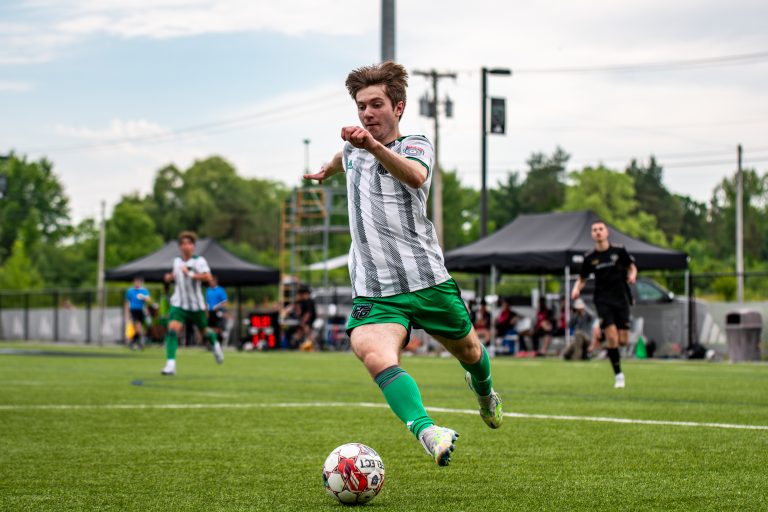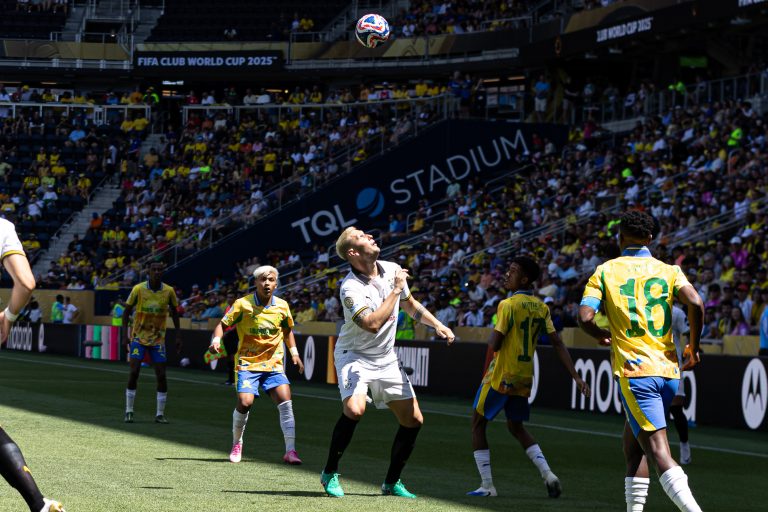
When the COVID-19 pandemic closed down swaths of the American economy, sports were shut down at all levels. Minneapolis City SC, a club based in south side of the city that plays in the NPSL, found themselves without a season. The front office, staffed entirely by volunteers, went on with their day jobs. The players, none of whom are paid, continued with their other occupations. The team’s club shop on 38th Street closed. It would reopen as something else entirely.
On May 25th, on 38th Street, a little over a mile from the Minneapolis City team shop, George Floyd was murdered. The ensuing protests would envelope the city and eventually the nation. A community found themselves in chaos, reeling from a tragedy that exposed the worst flaws in society. As the city looked for ways to heal, a community-based sports team with no income stepped up to help.
After helping clean up streets and businesses affected by the protests and riots in the area, staff and players of Minneapolis City realized their community had a bigger need – food and supplies.
“There was a lot of residents that were cut off from different places that they shop, or the grocery stores that were open, their supply lines were cut,” said Minneapolis City general manager Adam Pribyl.
The team began taking in donations and running a store out of their supply shop and have been doing so every Saturday since. For this club, “sticking to sports” simply wasn’t an option.

“We had a group out on that Saturday to do clean up around South Minneapolis,” said team Minneapolis City business directed Sarah Schreier. “That same day, we noticed that groups that were collecting donations were overwhelmed with items — so much so that they couldn’t keep up. We decided to work with one of the groups to see if we could use our Club Shop, which was empty anyway due to COVID, as an alternate drop site. The next day, we were up and running and the response to the drive was incredible. We had players, fans, staff turn up to volunteer with us. As sites continued to be overwhelmed with donations, many were directed to our Shop to drop off. We had bags and bags of food for families lined up on the side walk, mountains of diapers, and a shop so full of food that you could hardly get in. So, we opened it up to families needing food and supplies to just take what they need.”
Getting people involved to help was simple, as the players all feel a deep tie to the community.
“When the club presented me with the opportunity to [help], and not just through soccer, just helping out with the situation that’s going on downtown, the hurt and the outcry of the community, it was an opportunity I couldn’t pass up,” said midfielder Josue Boutouli. “What the club does a good job is recognizing the holes that sometimes people don’t look at in the community or sometimes they get overlooked and obviously we can’t make a huge dent into the whole problem, but if we can help one or two people, that can go a long way. If just one person comes to the food bank and they are able to get groceries that day or get diapers, that’s all worth it.”
The feelings were similar for defender Myles Norville.
“I could’ve been George Floyd,” Norville said. “People like me who don’t necessarily come from a great deal and are trying to make the American dream, I can get out there and help them in some way get back on their feet. I just wanted to lend a helping hand where I could and I felt like I was being a part of the community I live in.”
Being a club of small financial means didn’t prevent the team from having a large financial impact, and may have even been a benefit. Donations poured in from as far away as Europe, and the team didn’t have to worry about any larger implications from their activities.
“We’ll take our MLS partners [Minnesota United], a major league soccer team they’ve got to worry about a lot of different things, in terms of how are things going to be perceived, season ticket holders, sponsorships, all these different things wrapped up in money,” Pribyl said. “You have to be concerned when you’re doing anything political, anything of that nature. For us, this is who we are. If you don’t support us, that’s ok. To us, Minneapolis City, we are representative of the Minneapolis community. We are Minneapolis. Our city is grieving and we’re trying to heal and also trying to affect real change.”
Players emphasized the teams focus on community as a reason why helping out the southern area of the city was an easy choice.
“We just want to use soccer as a method to connect, which is different from some other teams,” said defender Aaron Olson. “It’s not a ‘hey we need you to come here to our game, to pay for our tickets to make sure that our club is sustainable.’ It’s ‘we want to provide entertainment and we want to show that we can create a better community by bringing all these people together and enjoying something together. A lot of people were focusing on some other areas of the city and so we really did provide an outlet of supplies and needed groceries and toiletries and all of that to parts of the community that felt a bit stranded. Transportation was tough.”

To those wondering what they can do, the team has advice – get involved, do your research, and use the platforms you have available.
“I was a bit of a bystander prior to this,” Olson said. “I knew there were issues but was not aware of the extent. And now that I’ve done the research on the topic it’s incredibly depressing. A city I love so much that I call home hasn’t had the equity that it should have.”
“There is a certain amount of white guilt that is prevalent when something like this happens,” said Pribyl. “You say yeah, I’m not racist, but I feel bad, so I want to get involved somehow. The simplest thing for many I think is to go on and click a button and donate money. When you look at, for example, the earthquakes in Haiti in 2010, those relief efforts, over three billion dollars of donation money went missing. So, it’s really important to do your research and make sure you’re finding organizations that are doing true work and are stating where the money is going.”
“Soccer is just a game, but it’s a very community thing,” said Boutouli. “Sports culture is based on community culture. It’s important for teams to go up and take a stand whether its politics or injustice or just a little opinion, regardless of what you think, it’s important to do that because sports teams are part of a community. They provide culture. They bring people together. When you have that kind of platform, that kind of influence in a community, I think it’s important for people to stand up and take action for it. Whether that’s kneeling or hosting a food bank, there are so many different ways people can make a stand for something and respond to the community. If the community is hurt, respond in any way you can. There’s a big MLS team, and then there is the community club that fills that gap and is able to reach out to so many other people who may not always go to MLS games or maybe aren’t MLS fans. Minneapolis City is on the ground. We’re part of the people. We are the people. It’s crucial for us to stand up. If we can, we should.”





